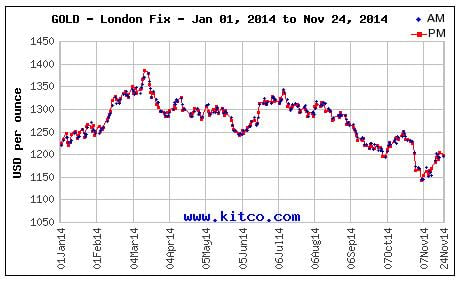The gold price today (Monday) rose as much as $50 per ounce after Switzerland voted Sunday to reject a referendum that would force the Swiss National Bank to hold some 20% (about $540 billion) of its reserves in gold.
Gold futures rose $42.60 - 3.6% - to $1,218.10 an ounce. This is the first time gold has closed above $1,200 an ounce since Oct. 29.
 In Switzerland's landslide vote, roughly 78% voted against "protecting the country's wealth by investing in gold."
In Switzerland's landslide vote, roughly 78% voted against "protecting the country's wealth by investing in gold."
The "Save our Swiss Gold" rally cry would have prohibited the SNB from ever selling any of its bullion and would have required the 30% currently stored in Canada and the U.K. to be repatriated.
A "yes" vote would have been bullish for gold - but gold rose today anyway. One of the reasons is because the metal was oversold before the vote.
"The expectation was the vote would fail, so gold sold off ahead of time," said Money Morning Global Resource Specialist Peter Krauth. "But there was an overreaction in selling."
Up until about a decade ago, Switzerland boasted the highest gold reserves per-capita in the world. Referendum approval would have made Switzerland the world's third-largest gold holder by country, with about 1,932 tons.
Many in Switzerland still believe gold is the foundation for and the pillar of a strong currency. But apparently many more don't...
"I think the issue in Switzerland is dead and buried," Adam Button, a currency analyst from Forexlive.com, told Kitco. "It shows that among the public, the appetite for gold as a reserves asset may not be as strong as we think. It shows that more people support 21st century monetary policy."
The initiative was widely criticized by the Swiss business and political communities because of its potential to interfere with the central bank's monetary policies.
Heading into the vote, this year's gold price had lost 16% since peaking on March 14 at $1,385 an ounce, and investor holdings of exchange traded products tied to gold are near a five-year low. HSBC estimated a "yes" vote would have also added as much as $50 an ounce to the yellow metal.
"The Swiss have always had an affinity with gold" and that's one of the reasons for the referendum, Eric Schreiber, an independent investor and former head of commodities at Swiss wealth manager Union Bancaire Privée, told Bloomberg. "It would have been supportive for gold due to the fact that if gold prices dropped, the SNB would have bought more. That would have put a floor on gold."
Now with a firm "nay" vote in place, gold prices were pressured initially - but only momentarily...
Gold Price Today Glitters Despite No Vote
Gold for immediate delivery fell as much as 2.1% to $1,142.88 an ounce in early Monday London trading, the lowest level since Nov. 7. Gold prices rebounded today, however, as some precious metal traders closed out bearish bets. That sent gold up 0.7% at $1,175.33 shortly before noon London time.
In New York mid-morning trading, gold prices followed London's lead and jumped $28.80, or $2.46%, to $1198.30. Just after noon, yellow metal prices marched higher still, with spot gold up $45.90, or 3.93%, at $1,215.50
Some analysts cited short covering for the bounce, and others said bargain hunting is why gold is up today.
Also goosing gold Monday were a weaker U.S. dollar and modestly firmer crude oil prices, which provided some tailwinds for the overall precious metals market.
Further stoking yellow metal prices Monday was a rate cut to Japan's government debt rating. Moody's Investors Services trimmed its debt rating for Japan by one notch to A1 from Aa3. The rating agency cited uncertainty over the country's ability to cut its fiscal deficit after Prime Minister Shinzo Abe last month postponed an increase to the national sales tax scheduled to take effect in October 2015.
"You always have that safe-haven asset buying in gold when a big nation like that is downgraded," Thomas Capalbo, a broker with Newedge in New York, told The Wall Street Journal.
And despite the fact the Swiss initiative failed, it did shine a bright spotlight on gold's benefits.
"At least the Swiss people are talking about their nation's current economic problems and the role of gold in a sound currency," Krauth said. "No doubt many today are wondering why the changes that allowed the sale of their country's gold were ever implemented."
More on Gold Investing: Gold prices have taken a beating in recent months, tumbling to four-year lows. But love it or hate it, gold is a smart way to manage risk in your portfolio. Our Chief Investment Strategist Keith Fitz-Gerald shared with readers the perfect strategy for gold investing in moments like this. Use his test to determine if you own the right amount of yellow metal in your portfolio - then, use this tip for the best way to buy more...
Related Articles:


